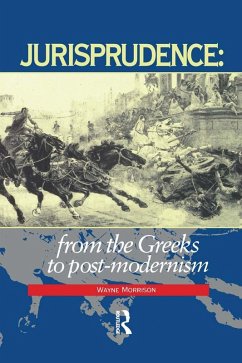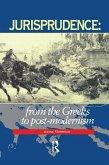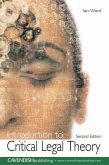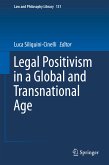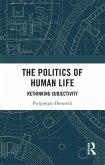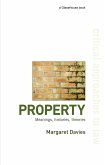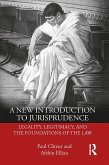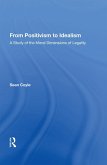53,95 €
53,95 €
inkl. MwSt.
Sofort per Download lieferbar

27 °P sammeln
53,95 €
Als Download kaufen

53,95 €
inkl. MwSt.
Sofort per Download lieferbar

27 °P sammeln
Jetzt verschenken
Alle Infos zum eBook verschenken
53,95 €
inkl. MwSt.
Sofort per Download lieferbar
Alle Infos zum eBook verschenken

27 °P sammeln
- Format: PDF
- Merkliste
- Auf die Merkliste
- Bewerten Bewerten
- Teilen
- Produkt teilen
- Produkterinnerung
- Produkterinnerung

Bitte loggen Sie sich zunächst in Ihr Kundenkonto ein oder registrieren Sie sich bei
bücher.de, um das eBook-Abo tolino select nutzen zu können.
Hier können Sie sich einloggen
Hier können Sie sich einloggen
Sie sind bereits eingeloggt. Klicken Sie auf 2. tolino select Abo, um fortzufahren.

Bitte loggen Sie sich zunächst in Ihr Kundenkonto ein oder registrieren Sie sich bei bücher.de, um das eBook-Abo tolino select nutzen zu können.
This challenging book on jurisprudence begins by posing questions in the post-modern context,and then seeks to bridge the gap between our traditions and contemporary situation.
- Geräte: PC
- mit Kopierschutz
- eBook Hilfe
- Größe: 28.19MB
Andere Kunden interessierten sich auch für
![Jurisprudence (eBook, ePUB) Jurisprudence (eBook, ePUB)]() Wayne MorrisonJurisprudence (eBook, ePUB)54,95 €
Wayne MorrisonJurisprudence (eBook, ePUB)54,95 €![Introduction to Critical Legal Theory (eBook, PDF) Introduction to Critical Legal Theory (eBook, PDF)]() Ian WardIntroduction to Critical Legal Theory (eBook, PDF)54,95 €
Ian WardIntroduction to Critical Legal Theory (eBook, PDF)54,95 €![Legal Positivism in a Global and Transnational Age (eBook, PDF) Legal Positivism in a Global and Transnational Age (eBook, PDF)]() Legal Positivism in a Global and Transnational Age (eBook, PDF)113,95 €
Legal Positivism in a Global and Transnational Age (eBook, PDF)113,95 €![The Politics of Human Life (eBook, PDF) The Politics of Human Life (eBook, PDF)]() Piergiorgio DonatelliThe Politics of Human Life (eBook, PDF)40,95 €
Piergiorgio DonatelliThe Politics of Human Life (eBook, PDF)40,95 €![Property (eBook, PDF) Property (eBook, PDF)]() Margaret DaviesProperty (eBook, PDF)48,95 €
Margaret DaviesProperty (eBook, PDF)48,95 €![A New Introduction to Jurisprudence (eBook, PDF) A New Introduction to Jurisprudence (eBook, PDF)]() Paul CliteurA New Introduction to Jurisprudence (eBook, PDF)40,95 €
Paul CliteurA New Introduction to Jurisprudence (eBook, PDF)40,95 €![From Positivism to Idealism (eBook, PDF) From Positivism to Idealism (eBook, PDF)]() Sean CoyleFrom Positivism to Idealism (eBook, PDF)32,95 €
Sean CoyleFrom Positivism to Idealism (eBook, PDF)32,95 €-
-
-
This challenging book on jurisprudence begins by posing questions in the post-modern context,and then seeks to bridge the gap between our traditions and contemporary situation.
Dieser Download kann aus rechtlichen Gründen nur mit Rechnungsadresse in A, B, BG, CY, CZ, D, DK, EW, E, FIN, F, GR, HR, H, IRL, I, LT, L, LR, M, NL, PL, P, R, S, SLO, SK ausgeliefert werden.
Produktdetails
- Produktdetails
- Verlag: Taylor & Francis eBooks
- Seitenzahl: 600
- Erscheinungstermin: 8. April 2016
- Englisch
- ISBN-13: 9781135352820
- Artikelnr.: 44876590
- Verlag: Taylor & Francis eBooks
- Seitenzahl: 600
- Erscheinungstermin: 8. April 2016
- Englisch
- ISBN-13: 9781135352820
- Artikelnr.: 44876590
- Herstellerkennzeichnung Die Herstellerinformationen sind derzeit nicht verfügbar.
Wayne Morrison
Chapter 1 The Problem of Jurisprudence, or Telling the Truth of Law: an
entry into recurring questions?; Chapter 2 Origins: Classical Greece and
the idea of Natural Law; Chapter 3 The Laws of Nature, Man's Power and God:
the synthesis of mediaeval Christendom; Chapter 4 Thomas Hobbes and the
Origins of the Imperative Theory of Law: or nana transformed into earthly
power; Chapter 5 David Hume - Defender of Experience and Tradition Against
the Claims of Reason to Guide Modernity; Chapter 6 Immanuel Kant and the
Promotion of a Critical Rational Modernity; Chapter 7 From Rousseau to
Hegel: the birth of the expressive tradition of law and the dream of Law's
Ethical Life; Chapter 8 Adam Smith, Jeremy Bentham and John Stuart Mill:
the early development of a utilitarian foundation for law; Chapter 9 John
Austin and the Misunderstood Birth of Legal Positivism; Chapter 10 Karl
Marx 1 Marx (1818-1883) was bom in Trier, in what is now Germany. He was
the oldest son of a Jewish lawyer and the descendent of a long line of
rabbis. His father converted to Protestantism in order not to harm his
legal business and Marx was educated as a Protestant. Rationalism,
humanitananism and a pragmatic view of the world were the messages of his
upbringing, rather than religious fundamentalism. and the Marxist Heritage
for Understanding Law And Society; Chapter 11 Weber, Nietzsche and the
Holocaust: towards the disenchantment of modernity; Chapter 12 The Pure
Theory of Hans Kelsen; Chapter 13 : 418). and the theory of law as a
self-referring system of rules; Chapter 14 Liberalism and the Idea of the
Just Society in Late Modernity: a reading of Kelsen, Fuller, Rawls, Nozick
and communitarian critics; Chapter 15 Ronald Dworkin and the Struggle
Against Disenchantment: or law within the interpretative ethics of liberal
jurisprudence; Chapter 16 Scepticism, Suspicion and the Critical Legal
Studies Movement; Chapter 17 Understanding Feminist Jurisprudence; Chapter
18 Concluding Remarks: or reflections on the temptations for jurisprudence
in post-modernity;
entry into recurring questions?; Chapter 2 Origins: Classical Greece and
the idea of Natural Law; Chapter 3 The Laws of Nature, Man's Power and God:
the synthesis of mediaeval Christendom; Chapter 4 Thomas Hobbes and the
Origins of the Imperative Theory of Law: or nana transformed into earthly
power; Chapter 5 David Hume - Defender of Experience and Tradition Against
the Claims of Reason to Guide Modernity; Chapter 6 Immanuel Kant and the
Promotion of a Critical Rational Modernity; Chapter 7 From Rousseau to
Hegel: the birth of the expressive tradition of law and the dream of Law's
Ethical Life; Chapter 8 Adam Smith, Jeremy Bentham and John Stuart Mill:
the early development of a utilitarian foundation for law; Chapter 9 John
Austin and the Misunderstood Birth of Legal Positivism; Chapter 10 Karl
Marx 1 Marx (1818-1883) was bom in Trier, in what is now Germany. He was
the oldest son of a Jewish lawyer and the descendent of a long line of
rabbis. His father converted to Protestantism in order not to harm his
legal business and Marx was educated as a Protestant. Rationalism,
humanitananism and a pragmatic view of the world were the messages of his
upbringing, rather than religious fundamentalism. and the Marxist Heritage
for Understanding Law And Society; Chapter 11 Weber, Nietzsche and the
Holocaust: towards the disenchantment of modernity; Chapter 12 The Pure
Theory of Hans Kelsen; Chapter 13 : 418). and the theory of law as a
self-referring system of rules; Chapter 14 Liberalism and the Idea of the
Just Society in Late Modernity: a reading of Kelsen, Fuller, Rawls, Nozick
and communitarian critics; Chapter 15 Ronald Dworkin and the Struggle
Against Disenchantment: or law within the interpretative ethics of liberal
jurisprudence; Chapter 16 Scepticism, Suspicion and the Critical Legal
Studies Movement; Chapter 17 Understanding Feminist Jurisprudence; Chapter
18 Concluding Remarks: or reflections on the temptations for jurisprudence
in post-modernity;
Chapter 1 The Problem of Jurisprudence, or Telling the Truth of Law: an entry into recurring questions?; Chapter 2 Origins: Classical Greece and the idea of Natural Law; Chapter 3 The Laws of Nature, Man's Power and God: the synthesis of mediaeval Christendom; Chapter 4 Thomas Hobbes and the Origins of the Imperative Theory of Law: or nana transformed into earthly power; Chapter 5 David Hume - Defender of Experience and Tradition Against the Claims of Reason to Guide Modernity; Chapter 6 Immanuel Kant and the Promotion of a Critical Rational Modernity; Chapter 7 From Rousseau to Hegel: the birth of the expressive tradition of law and the dream of Law's Ethical Life; Chapter 8 Adam Smith, Jeremy Bentham and John Stuart Mill: the early development of a utilitarian foundation for law; Chapter 9 John Austin and the Misunderstood Birth of Legal Positivism; Chapter 10 Karl Marx 1 Marx (1818-1883) was bom in Trier, in what is now Germany. He was the oldest son of a Jewish lawyer and the descendent of a long line of rabbis. His father converted to Protestantism in order not to harm his legal business and Marx was educated as a Protestant. Rationalism, humanitananism and a pragmatic view of the world were the messages of his upbringing, rather than religious fundamentalism. and the Marxist Heritage for Understanding Law And Society; Chapter 11 Weber, Nietzsche and the Holocaust: towards the disenchantment of modernity; Chapter 12 The Pure Theory of Hans Kelsen; Chapter 13 : 418). and the theory of law as a self-referring system of rules; Chapter 14 Liberalism and the Idea of the Just Society in Late Modernity: a reading of Kelsen, Fuller, Rawls, Nozick and communitarian critics; Chapter 15 Ronald Dworkin and the Struggle Against Disenchantment: or law within the interpretative ethics of liberal jurisprudence; Chapter 16 Scepticism, Suspicion and the Critical Legal Studies Movement; Chapter 17 Understanding Feminist Jurisprudence; Chapter 18 Concluding Remarks: or reflections on the temptations for jurisprudence in post-modernity;
Chapter 1 The Problem of Jurisprudence, or Telling the Truth of Law: an
entry into recurring questions?; Chapter 2 Origins: Classical Greece and
the idea of Natural Law; Chapter 3 The Laws of Nature, Man's Power and God:
the synthesis of mediaeval Christendom; Chapter 4 Thomas Hobbes and the
Origins of the Imperative Theory of Law: or nana transformed into earthly
power; Chapter 5 David Hume - Defender of Experience and Tradition Against
the Claims of Reason to Guide Modernity; Chapter 6 Immanuel Kant and the
Promotion of a Critical Rational Modernity; Chapter 7 From Rousseau to
Hegel: the birth of the expressive tradition of law and the dream of Law's
Ethical Life; Chapter 8 Adam Smith, Jeremy Bentham and John Stuart Mill:
the early development of a utilitarian foundation for law; Chapter 9 John
Austin and the Misunderstood Birth of Legal Positivism; Chapter 10 Karl
Marx 1 Marx (1818-1883) was bom in Trier, in what is now Germany. He was
the oldest son of a Jewish lawyer and the descendent of a long line of
rabbis. His father converted to Protestantism in order not to harm his
legal business and Marx was educated as a Protestant. Rationalism,
humanitananism and a pragmatic view of the world were the messages of his
upbringing, rather than religious fundamentalism. and the Marxist Heritage
for Understanding Law And Society; Chapter 11 Weber, Nietzsche and the
Holocaust: towards the disenchantment of modernity; Chapter 12 The Pure
Theory of Hans Kelsen; Chapter 13 : 418). and the theory of law as a
self-referring system of rules; Chapter 14 Liberalism and the Idea of the
Just Society in Late Modernity: a reading of Kelsen, Fuller, Rawls, Nozick
and communitarian critics; Chapter 15 Ronald Dworkin and the Struggle
Against Disenchantment: or law within the interpretative ethics of liberal
jurisprudence; Chapter 16 Scepticism, Suspicion and the Critical Legal
Studies Movement; Chapter 17 Understanding Feminist Jurisprudence; Chapter
18 Concluding Remarks: or reflections on the temptations for jurisprudence
in post-modernity;
entry into recurring questions?; Chapter 2 Origins: Classical Greece and
the idea of Natural Law; Chapter 3 The Laws of Nature, Man's Power and God:
the synthesis of mediaeval Christendom; Chapter 4 Thomas Hobbes and the
Origins of the Imperative Theory of Law: or nana transformed into earthly
power; Chapter 5 David Hume - Defender of Experience and Tradition Against
the Claims of Reason to Guide Modernity; Chapter 6 Immanuel Kant and the
Promotion of a Critical Rational Modernity; Chapter 7 From Rousseau to
Hegel: the birth of the expressive tradition of law and the dream of Law's
Ethical Life; Chapter 8 Adam Smith, Jeremy Bentham and John Stuart Mill:
the early development of a utilitarian foundation for law; Chapter 9 John
Austin and the Misunderstood Birth of Legal Positivism; Chapter 10 Karl
Marx 1 Marx (1818-1883) was bom in Trier, in what is now Germany. He was
the oldest son of a Jewish lawyer and the descendent of a long line of
rabbis. His father converted to Protestantism in order not to harm his
legal business and Marx was educated as a Protestant. Rationalism,
humanitananism and a pragmatic view of the world were the messages of his
upbringing, rather than religious fundamentalism. and the Marxist Heritage
for Understanding Law And Society; Chapter 11 Weber, Nietzsche and the
Holocaust: towards the disenchantment of modernity; Chapter 12 The Pure
Theory of Hans Kelsen; Chapter 13 : 418). and the theory of law as a
self-referring system of rules; Chapter 14 Liberalism and the Idea of the
Just Society in Late Modernity: a reading of Kelsen, Fuller, Rawls, Nozick
and communitarian critics; Chapter 15 Ronald Dworkin and the Struggle
Against Disenchantment: or law within the interpretative ethics of liberal
jurisprudence; Chapter 16 Scepticism, Suspicion and the Critical Legal
Studies Movement; Chapter 17 Understanding Feminist Jurisprudence; Chapter
18 Concluding Remarks: or reflections on the temptations for jurisprudence
in post-modernity;
Chapter 1 The Problem of Jurisprudence, or Telling the Truth of Law: an entry into recurring questions?; Chapter 2 Origins: Classical Greece and the idea of Natural Law; Chapter 3 The Laws of Nature, Man's Power and God: the synthesis of mediaeval Christendom; Chapter 4 Thomas Hobbes and the Origins of the Imperative Theory of Law: or nana transformed into earthly power; Chapter 5 David Hume - Defender of Experience and Tradition Against the Claims of Reason to Guide Modernity; Chapter 6 Immanuel Kant and the Promotion of a Critical Rational Modernity; Chapter 7 From Rousseau to Hegel: the birth of the expressive tradition of law and the dream of Law's Ethical Life; Chapter 8 Adam Smith, Jeremy Bentham and John Stuart Mill: the early development of a utilitarian foundation for law; Chapter 9 John Austin and the Misunderstood Birth of Legal Positivism; Chapter 10 Karl Marx 1 Marx (1818-1883) was bom in Trier, in what is now Germany. He was the oldest son of a Jewish lawyer and the descendent of a long line of rabbis. His father converted to Protestantism in order not to harm his legal business and Marx was educated as a Protestant. Rationalism, humanitananism and a pragmatic view of the world were the messages of his upbringing, rather than religious fundamentalism. and the Marxist Heritage for Understanding Law And Society; Chapter 11 Weber, Nietzsche and the Holocaust: towards the disenchantment of modernity; Chapter 12 The Pure Theory of Hans Kelsen; Chapter 13 : 418). and the theory of law as a self-referring system of rules; Chapter 14 Liberalism and the Idea of the Just Society in Late Modernity: a reading of Kelsen, Fuller, Rawls, Nozick and communitarian critics; Chapter 15 Ronald Dworkin and the Struggle Against Disenchantment: or law within the interpretative ethics of liberal jurisprudence; Chapter 16 Scepticism, Suspicion and the Critical Legal Studies Movement; Chapter 17 Understanding Feminist Jurisprudence; Chapter 18 Concluding Remarks: or reflections on the temptations for jurisprudence in post-modernity;
